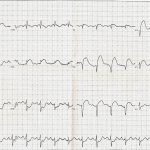With GPs now receiving conflicting advice about whether they should interpret ECGs, the Department of Health will review the new items in six months.
The ECG mess continues, with GPs told they can still interpret the test despite Medicare wording to the contrary.
Professor Richard Harper, chair of the Cardiac Services Clinical Committee, now says that the new item 11707 was intended to allow GPs to trace and interpret, even if they don’t create a thorough report of it.
Meanwhile, the Department of Health has flagged that the new MBS item numbers will be reviewed in six months, following sustained backlash from individual doctors and medical groups.
Clarifying the item number description would allay fears around the medicolegal issues inherent in doing a test that doesn’t appear to be serious enough for interpretation.
“The item description says that we are only to make a tracing in situations where our full interpretation is not required. Now, that’s just ridiculous because I only ever do an ECG if I think it needs to be interpreted,” said Professor Brett Montgomery, GP and senior lecturer at the University of Western Australia.
“It sounds like some kind of Schrödinger’s ECG interpretation, where it is interpreted and not interpreted at the same time,” he said, noting that it raised alarm bells around his medicolegal obligations.
“How do I ethically bill this item that says I’m not allowed to bill it if it needs full interpretation while also doing the interpretation that is necessary to be medicolegally defensible?”
Speaking to newsGP, Professor Harper acknowledged that the item number was poorly written.
“Clearly there is no point in doing an ECG if it is not going to be interpreted,” he said. “In retrospect the wording of the descriptor ‘ECG tracing only’ could have been better framed. The word ‘only’ referred to the fact that a formal report was not required, but was not meant to imply that interpretation was not allowed.”
“A better wording for 11707 would have been ‘ECG tracing and interpretation’ and I am hopeful that the Health Department will make this change.”
But even if that change is made, GPs are left earning less than their counterparts for the same work, said Professor Montgomery.
“GP interpretation of ECG is being remunerated significantly less than if it’s done by any other medical specialist,” he said, pointing out that pathologists or psychiatrists interpreting an ECG would be paid more than GPs.
“It’s an inequity that I don’t understand.”
It isn’t simply in the financial sense that GPs are feeling devalued either. Comments from health authorities delineating the role of GPs and other specialists, and suggesting that the changes were made due to “safety concerns”, suggests that GPs are unsafe when interpreting the results, said Professor Montgomery.
“Now I don’t pretend to be quite as sophisticated an interpreter of ECGs as your average cardiologist, but I do think what I’m good at doing is most ECG interpretation, and I’m good at knowing my limits,” he said. “Just like everything else GPs do.”
RACGP Queensland Chair Dr Bruce Willett echoed the concern, noting that his practice has a policy of keeping patients in the practice until a doctor has looked at the ECG – “Because you never know what you will find out, and it could be disastrous.”
Remunerating GPs less because they don’t issue a full report like a pathologist does also undervalues the work that GPs do that doesn’t necessarily get recorded, he said.
“I can understand where the commonwealth was coming from, but it does seem to be feeding into this bureaucracy that we’re required to write things down more and more, rather than actually dealing with patients,” he said.
Patients often complained that GPs spent too long looking at the computer, he said. This was of particular concern in mental health care.
While calls to postpone or scrap the MBS item number changes have been ignored, the department has announced that the changes will be reviewed early 2021.
“I would certainly welcome the fact that the government has recognised that there’s an issue here and are willing to review it,” said Dr Willett. “Of course, there’s no guarantee that in the course of that review the decision will be in any way overturned.”
“We hope that common sense will prevail and we recognise that you can’t do ECGs and then not read them.”
UPDATE: A spokeswoman for the Department of Health confirmed that a review into the item numbers would launch on February 1.
“The review process will involve consideration of any clinical or implementation concerns about the changes, and consideration of concerns raised by stakeholders,” she told TMR.
“The Department will consider whether amendments to the item are required as part of the review.”




